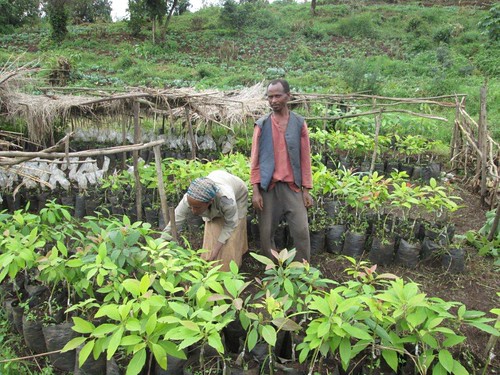Written by Gemeda Duguma and Amenti Chali

LIVES’ model farmers, Ijigu Tefera and his wife, removing weeds from grafted avocado seedlings (photo credit: ILRI\Amenti Chali).
The Livestock and Irrigation Value Chains for Ethiopian Smallholders (LIVES) project recently trained farmers in Jimma zone of Oromia region, on grafting and management of improved avocado seedlings.
Ijigu Tefera has grafted and raised more than 1000 improved avocado seedlings. He earned ETB 25,000 (USD 1,250) from the first batch of seedlings he sold.
The training, which was done in collaboration with the Jimma zone and Dedo, Kersa and Seka Chekorsa districts’ irrigation development authorities, targeted nine model farmers, who will then supply these seedlings to smallholder farmers in the region.
Jimma zone is one of the largest avocado producing areas in Oromia. Across Ethopia, more than half a million farmers produce 80,000 tons of avocados every year and many smallholder households in the country depend on avocado farming for their livelihoods.
But most of the avocado trees in the country are low yielding, take long to start fruiting (six-seven years) and grow to more than 20 metres in height making harvesting difficult and increasing post-harvest losses. Shortage of improved avocado seedlings is a major bottleneck to improving avocado production in the country.
Ijigu Tefera, one of the LIVES model farmers in Kersa District in Jimma, took part in the avocado grafting and management training sessions and study tours that also targeted development workers in the region. As part of the exercise, Ijigu and other model farmers were trained and given grafting equipment to graft avocado seedlings that will serve as future high-yielding mother trees for scion production. The improved avocado seedlings not only yield more but also take a shorter time to start bearing fruit (about three years) and are much shorter (five-six metres tall) for easier fruit harvesting.
Following this intervention, Ijigu has grafted and raised more than 1000 improved avocado seedlings. He earned ETB 25,000 (USD 1,250) from the first batch of seedlings (about 500) he sold. He has successfully transplanted 17 grafted seedlings for fruit and scion production and he also own 24 avocado trees grown from seedlings that LIVES provided previously. Currently, Ijigu is collecting avocado seeds to raise root stocks to produce both scion and grafted seedlings and he is also involved in avocado fruit production.
To help scale out the use of these seedlings in the Jimma, LIVES organized a field day for development workers, local administrations and more than 200 farmers from 16 kebeles who visited Ijigu’s farm to learn from his experience.